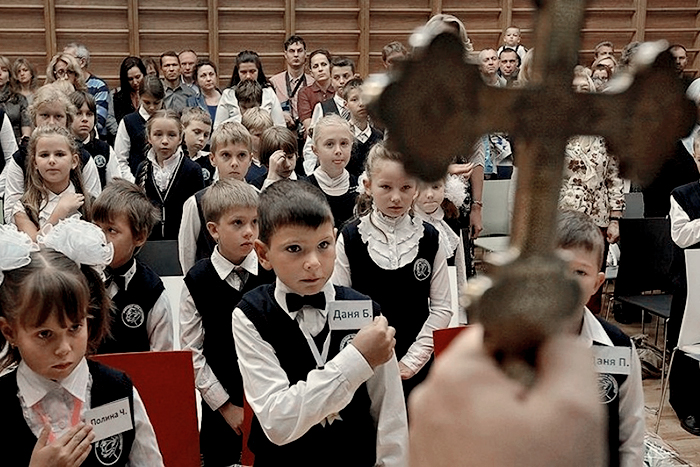
The relationship between religious children and the world, or rather between children from Christian families and their non-religious peers, is a challenging topic. The very situation presupposes tension and conflict, especially today, when the Church quite explicitly opposes the trends and fashions of public life, which it sees as sin – and which are already quite common for our society. Whether we like it or not, spiritual issues are more pressing and critical in people’s lives today than ever before, even if people choose to identify themselves as unbelievers.
Let your light so shine before men, that they may see your good works, and glorify your Father which is in heaven. (Matthew 5:16).
Children are usually prejudiced and hostile to each other – and that’s before they even start to discuss what they believe. A religious dimension exacerbates this distrust among children. I dare say that this is especially noticeable throughout adolescence, when the child starts to take part in family conversations and discussions and gets more curious about the life around him. Sometimes, however, children between the ages of 8 and 11 already consider themselves to be opponents of faith, and especially of the Church as a kind of parasitic and deceitful organization, whose adherents diligently deceive everyone and meddle in the affairs which are none of their business.
The Gospel has little in common with the books of other religions, from which people can learn how to live and rule the world. The New Testament crucifies us on the Cross and teaches us to overcome ourselves first, to serve others, to avoid and run away from any ideas of domination and triumph of brute power. The world where our children live and learn is a world of cruelty, with few exceptions. I find it superfluous to provide any examples for that statement: each of us has first-hand experience of the cruel world since childhood. There is a lot of evidence for the world being an unwelcoming place in classical literature as well. Therefore, it is no exaggeration to say that it is quite difficult for children from normal Christian families to survive in our society. Of course, the moral imperatives and commandments of the Gospel have nothing to do with the generally accepted laws of life, and it is difficult to put into practice, for example, the call of Christ to turn the left cheek after having been slapped on the right cheek… to put it mildly.
What’s to be done, then?
The only thing that can be used to counteract that is the active godliness of the whole family. The child should come to any group from home as if it were a temple, i. e., he should walk with Christ and never lose touch with Him. He or she doesn’t have to carry a banner with the cross on it, but rather walk hand in hand with the gentle Friend, with the Christian heart. The main problem is how the child can do this.
Let me try to introduce the plain and simple concept of “spiritual elitism”. In the human language it is a joy that a child learns in his or her family. Our parental task is to teach children to rejoice and not to be discouraged, to disregard the everyday problems in a way. Orthodoxy is indispensable for that!
Let me give you an example. One of my acquaintances is in the 11th grade of a typical school, and until now she was having difficulty communicating with her peers. What is her class like? Many kids live in single-parent families; everybody swears; girls, as a rule, are depressed: some of them have unrealized ambitions, some have bad life prospects or an unrequited love, and almost all of them say that “everything is bad”. Thus, despondency is prevalent. There are a few guys who belong to such subcultures as anime fans and jocks. Some guys drink openly.
With that said, their academic performance is above average: everything looks good on the surface. Girls do dancing and athletics. Teachers try to engage the students in theatrical shows as well as in various school-wide events: honoring veterans, holding library readings, sports events, etc. The usual school routine, you know.
But… There are plenty of swearing girls during breaks who use dirty language even when talking about their cute little brothers and their beloved mothers. This sounds particularly disgusting. Regrettably, it’s just a fad – as they say, nothing personal. Some boys smoke, chew naswar, and then act absolutely wildly: laugh, feel dopey, and fight lazily. And then again, there is the ubiquitous foul language. The children’s interest in life is low and their motivation is very weak, despite the fact that they are coming close to the time when they should be going to higher education institutions and adult life in general. This is the omen of the time, as the future generation is not very happy about the future.
The girl came to that class last year. Her parents moved and settled very far from the Orthodox school where she had studied before. They decided to reduce their transportation costs and have more free time.
At first, despite the fact that she could get more sleep, the child would come home with headaches every day. She would give just one definition for a secular school: Mordor.
“The dirty words keep ringing in my head… This slime is so sticky, I can’t get it out of my head. I am very tired.”
The girl’s parents on their part tried to distract her somehow: don’t dwell on it, don’t judge, let them copy your homework if they ask for it, help whoever you can and, most importantly, pursue your educational goals, there is a lot of work ahead in preparing for the Unified State Exam.
Is it any wonder that on the one hand, it makes you want to hide and not be noticed, and on the other hand, the goodness and cheerfulness inherent in Orthodox children take over. Life goes on with its successes, sports achievements, ingenuous and friendly communication without pride or arrogance. It can’t but attract others. At the end of the year, the deputy head teacher stopped the girl with the words:
“We’ve been talking about you with your classmates. Two of them said that they always wanted to hug you and that you were “cool” and cheerful.”
Moreover, at the general class survey she was unanimously nominated as a leader and, strange as it may seem, she took the second place among “the popular people of the class”. One day at the end of the year, when in the midst of a noisy discussion about the “stupid churchgoers”, the girl stood up and said that she was a believer and that not everybody in the class was an atheist, her classmates fell respectfully silent.
Thus, in my opinion, the recipe for communication between the believing and unbelieving children is non-judgment, goodwill, politeness, kindness and modesty, multiplied by simple family happiness of their parents. This is the kind of Orthodox “spiritual elitism”, if you will. Alas, it turns out that believing children need to become a kind of example, a flashlight, a battery – a candle that is not hidden under the bushel, but gives light to all those who are around it.
Translated by The Catalogue of Good Deeds
Source: https://pravoslavie.fm/articles/4110/



